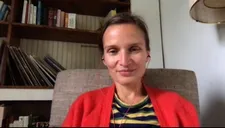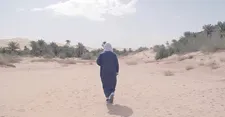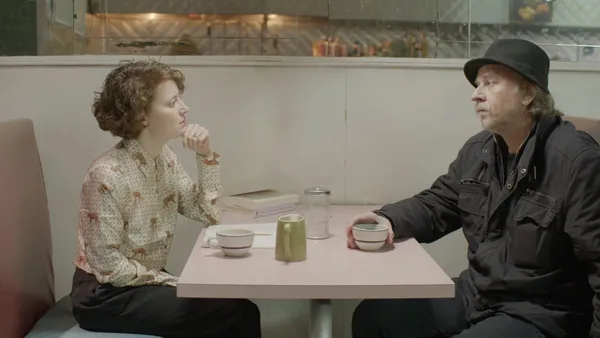 |
| Aleph director Iva Radivojević: “The idea is that each character leaves us off with a clue as to where we’re going next.” |
On the afternoon of the 93rd Academy Awards, a reference to David Lynch and a scene in Mulholland Drive, Luis Buñuel’s The Phantom Of Liberty, Apichatpong Weerasethakul’s Uncle Boonmee Who Can Recall His Past Lives and Luminous People (segment in State of the World), Likes And Dislikes by Roland Barthes, Andy Warhol, Alain Resnais, Aleph’s narrator Anne Waldman, and a short story by Jorge Luis Borges all came up in my conversation with Iva Radivojevic, the director/writer/editor/ of Aleph, a highlight of the 50th anniversary edition of New Directors/New Films.
With Jorge Luis Borges as the first of many guides, we travel around the globe to find the mysterious portal, the letter aleph that contains the whole universe. In this delicately told and forcefully edited film, what we see is often not what we hear. The truth lies elsewhere. There is Clara in Buenos Aires, who “can’t feel anything these days.” A woman in a white Louis XIV wig stares in a museum at a painting from 1943 and is swallowed up by it. As “a place is only a memory,” a new guide takes us through labyrinthine streets in Algeria. Do we walk to the gardens of eternity? How did we get on the tram from Roosevelt Island and what can we learn about happiness and non-erasable guilt?
In a monastery nuns watch a billowing curtain. In the Himalayas monkeys come and go. Her face framed by her own arms, a woman in Kathmandu takes up the body language and emotional strands we encountered earlier in Argentina. “In her hair resides the concentration of the universe,” she says and we learn that the population of Bengal tigers has tripled. Off we race in a snowmobile to a radar station in Greenland, while crows carry messages to eternity. As “time passes differently in each place,” we meet a ghost on a train to Bangkok, who becomes our next guide on a boat ride with the mist rising blue from the waters.
Twins or doubles in matching zebra suits invite us to tea and all the eyes of Mexico stare back until we finally reach the vortex. The spiral takes us in, where a giraffe, a zebra, an antelope await, together with flamingos, fishes, an elephant, and - lo and behold - the woman who disappeared into the painting so many moons ago.
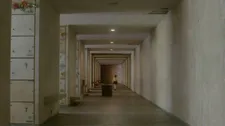 |
| Guillermina Pico in Argentina - Aleph |
From Upstate New York, Iva Radivojevic joined me on Zoom for an in-depth conversation on Aleph.
Anne-Katrin Titze: How are you feeling today?
Iva Radivojevic: Better, a little better. Between the jet lag and the travels and the people and the vaccine, it’s been a bit hectic, but yeah.
AKT: I was very impressed by your film and by how much you could actually fit into it. It’s almost, as you say, a whole universe contained in one letter. How did Borges and his short story come in? Was he a starting point early on or did he come in later?
IR: Thank you so much, I’m really really glad you liked the film. Borges was the first thing that I started from. I actually knew that I was going to make a story that combined together to form some kind of a whole but I didn’t know what the container for that would be and I was looking for a specific theme. I sat down to speak with a friend of mine, Rodrigo, who comes up at the front of the film.
AKT: One empty day in September on 23rd Street.
IR: That’s right! And as we were talking about this idea that I had, he brought up two different things to me, which was Borges and a film by Buñuel. He said watch this film and read this short story and see what it does for you. When I read the short story, of course everything clicked and made sense, you know microcosm, the universe, everything interconnected. So I used the story, the myth of this portal of Aleph as a starting point, the search for this portal. The whole film starts off almost like a game to find this portal.
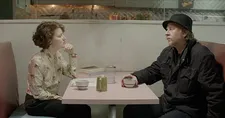 |
| Masa Dakic with Žarko Laušević in New York - Aleph |
AKT: What was the Buñuel film?
IR: The Buñuel film was Phantom Of Liberty.
AKT: The structure I found so interesting, the doubling, the mirroring that happens. Early on there is the woman named Clara, who says “I can’t feel anything these days.” She is in Buenos Aires. Later on we have the woman in Kathmandu saying “I feel too much.” Did some of the mirroring happen during your travels, or was it all planned out?
IR: It wasn’t planned out. I’ll start with the structure a little bit. I was thinking: what is the container of this film? Since Borges deals with labyrinths, mirrors, all of these motifs that run through his work, I said, okay, the shape of this film is going to be a labyrinth. In this case it’s a circular labyrinth because we come back to her in the beginning. So we start off in Argentina because it’s the land of Borges. And then of course each person is guiding me to the next place. I really don’t know what is going to happen down the line. It all happens in the process.
AKT: Was it all chronological? Did you travel this way?
IR: Yes. And the mirroring happened as I’m making this film, I’m also doing a lot of reading and research about each place that I’m in. Different arts and literature that’s available but also about Borges and his process. So for example, in a lot of his work he is inspired by the Arabian Nights. Something happens in the Arabian Nights where on the sixth night, there’s sort of a retelling of the beginning. So the mirroring that happens in Nepal, which is that kind of moment, is the mirroring. It’s a turning point where things have shifted and now we sort of enter a new phase.
AKT: That’s beautiful. Arabian Nights is all about the power of storytelling. We can only live, can only survive, if someone tells us stories. Or we tell ourselves stories in order to live, that’s a bit of Joan Didion thrown in there. You mentioned labyrinths - I just did an interview with Juja Dobrachkous, the director of Bebia, A Mon Seul Désir, which is also part of this years ND/NF, I don’t know if you’ve seen it?
IR: Not yet.
AKT: Her main character is called Ariadna who has to do a job with a thread and a labyrinth. A nice thread going on here.
IR: I look forward to seeing it.
AKT: With the guides that lead us, there are also some great funny moments in your film. The second guide, I believe, leads us to a conversation about Europeans and Americans who “do not participate in this world.” And we see the two men talking, one of them wears an Adidas jacket, the other one has Puma sandals. It’s a great juxtaposition.
IR: That line you just mentioned - we went in the desert, in the place we were filming this elder we were filming and he had many incredible and wise things to say and one of the things that he said was exactly that line. “Europeans and Americans do not participate in this world” and so on and so on. We are now in the desert and it’s very easy for someone to assume what that means and to assign stereotypical things to a person living in a desert. So we have Puma and also have him talk about Andy Warhol, which is something that is unexpected. It’s all playing with assumptions as well.
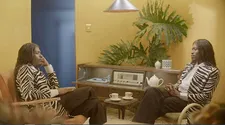 |
| Desire Marea having a conversation in South Africa - Aleph |
AKT: Another surprise was the gondola from Roosevelt Island. I was a bit stunned at first and didn’t recognize that this was the tramway that will lead us to a diner and a philosophical conversation going on. Can you talk a bit about that scene?
IR: The idea is that each character leaves us off with a clue as to where we’re going next. So two guys in Algeria, they are looking for a star. They are talking about stars. And then suddenly we’re in New York and we’re with a star, a person who used to be a famous actor. It’s almost to me as if each character has a metamorphosis. Is that what it’s called?
AKT: Yes, metamorphosis.
IR: Somehow the soul of one person enters the soul of another person to carry it on. The whole film is about love and contentment, really. So they are having this conversation about what does it mean to be happy. Or would you even recognize the happiest moment in your life? And if it is, would you then be more sad? And then of course going to this telepathic communication, when they are talking without opening their mouths. It’s all about dealing with reality through surrealism, right? Transporting us from this reality into something that we can… I guess, this reality is perhaps hard to deal with and in his other reality we are able to survive. I kind of went all over the place …
AKT: I think we know this kind of reality, every one of us, from dreams. In dream structures characters can merge in a metamorphosis. In dreams you can go next door to places that are worlds apart. Dream logic is so much informing your film but in such a clear way. I was amazed about the clarity because it can be messy, which it isn’t in your case. In the same scene there is the dialogue about if you murder someone, you’re a murderer forever. It’s the stuff of nightmares, when you notice you did something that cannot be undone. The woman who is pulled into the painting and the guard chewing on his sandwich. She returns in the end - I don’t think we need a spoiler alert - that to me was very much David Lynch. That was like the old couple in Mulholland Drive who come out of the paper bag. You remember them?
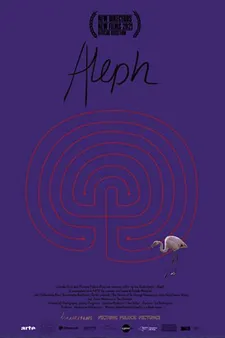 |
| Aleph is a highlight of the 50th anniversary edition of New Directors/New Films. |
IR: I mean, that’s a great compliment! Again, it’s like I wanted to remind you all the time that you are in this dreamscape. And to allow ourself to let go in the dream. I think the danger with this film is when people try to make sense. My main advice is: Don’t, just let it take you. By letting go, entering the unconscious, things are revealed.
AKT: And they are revealed in astonishing ways. The ghost story: “On the train she met a ghost.” And then the ghost that accompanies us all, made me think of Weerasethakul and his films, Uncle Boonmee Who Can Recall His Past Lives, for instance. The characters of myth that live right next to us. I loved how you were filming on the train, just people on the train from the back, the rest is in our imagination. We do the work of - ooh, this must be the ghost!
IR: Yes, every country that I went to, I would dive deeply into the customs and mythologies of the place. Of course Thailand has a really rich mythology of ghosts, of spirits that live among them. And each spirit has a different purpose. So it makes sense that the character in Thailand would be a ghost. Then what does it mean to be a ghost? What does it mean to have ghosts follow you? Giving little hints of survival and how to live. At the time I was watching Apichatpong’s film, a short film [Luminous People] on a boat. It’s a ritual, they are burying somebody. It’s a family in a boat, it’s 15 minutes or so. So definitely there are influences and inspirations.
AKT: I saw you mention Roland Barthes in the end credits. Was he helpful for structuring again?
IR: As I’m going to each place, I’m carrying all the books and acquire other books in the place I am in. When I was in Algeria, I was wondering how to have the characters introduce themselves or talk about themselves. I had found this piece by Roland Barthes, which you pronounce much better than I do, but he has this small sort of poem called Likes and Dislikes in which he just names all his likes and his dislikes. But they are very very specific. So you get the entire world of this person just by his likes and dislikes. And I thought what a brilliant way to let it all out. So I used that as a structure for Bouamama who talks and says “Life is a series of likes and dislikes. And here are mine.” Now we know who he is. He doesn’t like Andy Warhol, he doesn’t like French cars, but he likes …, you know. So in each place I was using different influences I was reading at the time to inform the structure.
Coming up - Iva Radivojevic on Alain Resnais, Anne Waldman, and more on Aleph.
Aleph screens on Friday, April 30 at 12:30pm Sold Out; Tuesday, May 11 at 12:30pm inside the Walter Reade Theater at Lincoln Center. There will be a pre-recorded post-screening Q&A.
The 2021 feature committee comprises Florence Almozini (Co-Chair, FLC), La Frances Hui (Co-Chair, MoMA), Rajendra Roy (MoMA), Josh Siegel (MoMA), Dan Sullivan (FLC), and Tyler Wilson (FLC), and the shorts were programmed by Brittany Shaw (MoMA) and Madeline Whittle (FLC).
New Directors/New Films at 50: A Retrospective is running free virtually through April 28.
The 50th anniversary edition of New Directors/New Films runs from April 28 through May 8 with the in-person screenings at Lincoln Center extended to May 13.








